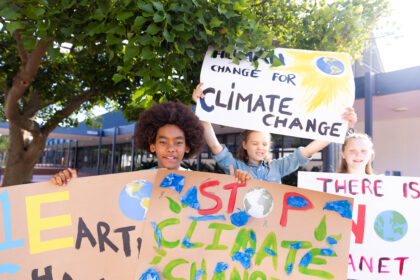Choosing Our Future: Education for Climate Action
A recent World Bank report, “Choosing Our Future: Education for Climate Action,” highlights the critical relationship between education and climate change. As extreme weather events increasingly disrupt schooling, especially in low- and middle-income countries, the report urges the global community to focus on education as a key avenue for climate action.
The Alarming Impact of Climate Change on Education
Since 2022, a staggering 400 million students globally have experienced school closures due to extreme weather. Low-income countries bear the brunt, losing an average of 18 school days annually, compared to just 2.4 days in wealthier nations. The report paints a stark picture of how students in these regions will face worsening climate shocks, such as floods, droughts, and heatwaves, as they grow older. A 10-year-old in 2024 will experience far more extreme climate events over their lifetime than previous generations, exacerbating learning gaps in regions already struggling with education access.
Education Systems Under Threat
Despite these mounting challenges, education remains underfunded in the context of climate financing, receiving a mere 1.5% of the global climate finance budget. This is a glaring oversight given the role schools can play in adapting to and mitigating the impacts of climate change. The report estimates that just $18.51 per child could help safeguard education systems by improving classroom conditions, constructing resilient school infrastructure, and training teachers to handle climate-related disruptions.
Young People as Agents of Climate Change
“Young people are directly impacted by this crisis, and they are eager to act,” said Mamta Murthi, Vice President, People Vice Presidency, World Bank. Unfortunately, education systems are failing to equip students with the skills and knowledge needed to tackle the climate emergency. Surveys show that while 65% of young people across low- and middle-income countries recognize the importance of developing green skills, 60% feel unprepared by their education systems to take meaningful climate action.
The Power of Education for Climate Awareness
Each additional year of education increases climate awareness by nearly 9%, according to data from 96 countries. The report emphasizes that education is crucial for shaping the mindsets, behaviors, and skills needed to address climate challenges. From building foundational skills to providing specialized training in Science, Technology, Engineering, and Math (STEM), schools have the potential to serve as the breeding ground for future green leaders.
Green Skills: Myths and Realities
Contrary to popular belief, green jobs do not always require STEM skills. According to the World Bank, 31% of green jobs in the Philippines are considered medium-skill roles. This busts the myth that green skills are only relevant for highly specialized professions. Instead, green skills are increasingly being demanded across various sectors and skill levels, particularly in low- and middle-income countries.
Solutions for Harnessing Education for Climate Action
The report outlines practical steps for governments to adapt education systems for a climate-affected world:
- Improving School Infrastructure: Governments should invest in making schools resilient to extreme weather, such as by improving classroom temperatures or reinforcing buildings against floods and storms.
- Ensuring Learning Continuity: Efforts should be made to ensure that learning can continue even in the face of climate disruptions, through online platforms or alternate schooling arrangements.
- Leveraging Students and Teachers as Change Agents: Teachers and students can serve as effective advocates for climate action, raising awareness and implementing sustainable practices within their communities.
- Green Skilling in Tertiary Education: As demand for green skills grows, tertiary education institutions should prioritize training that supports the shift to sustainable practices in various sectors.
Conclusion: Building a Sustainable Future through Education
The findings of the report are clear—education is a powerful tool in the fight against climate change. By improving school infrastructure, addressing learning gaps, and providing the necessary green skills, we can empower young people to lead the charge in creating a sustainable future. Governments and institutions must act now to harness education’s full potential to adapt to and mitigate the impacts of the climate crisis.






